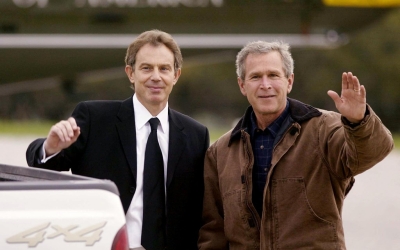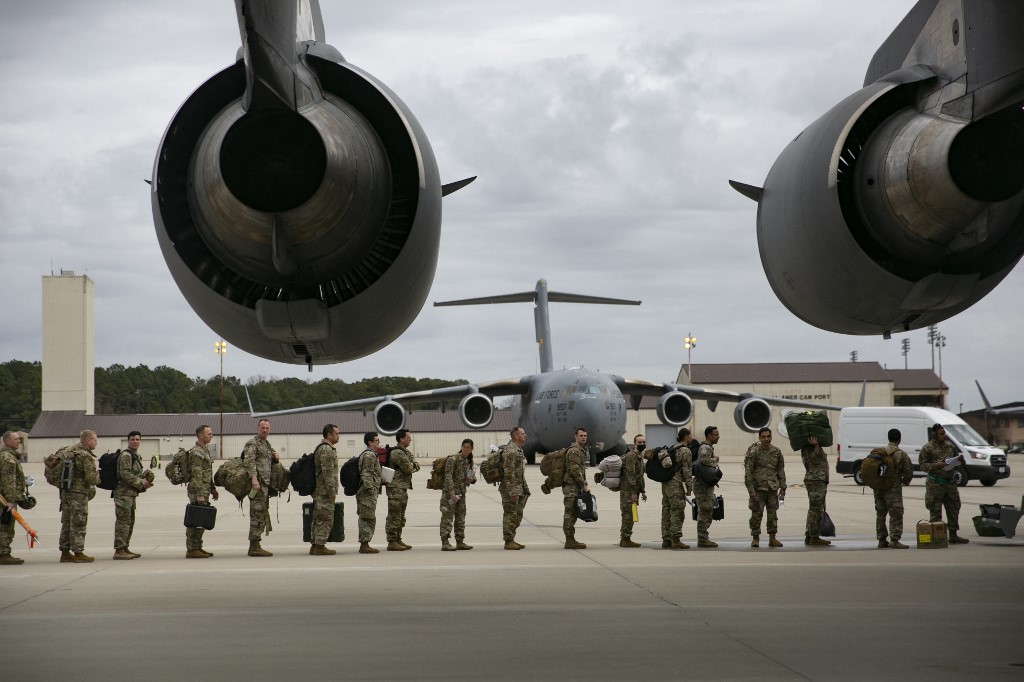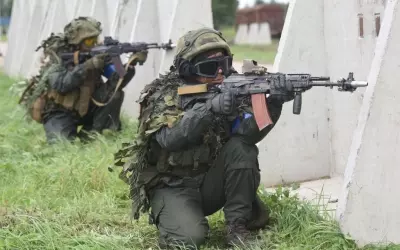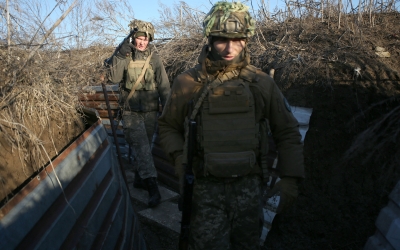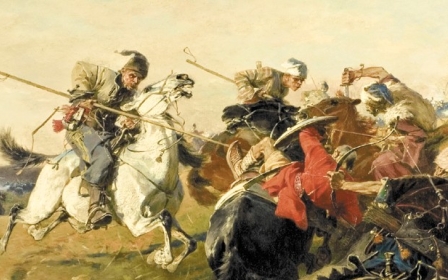Ukraine: As the media war peaks, now comes the moment of truth
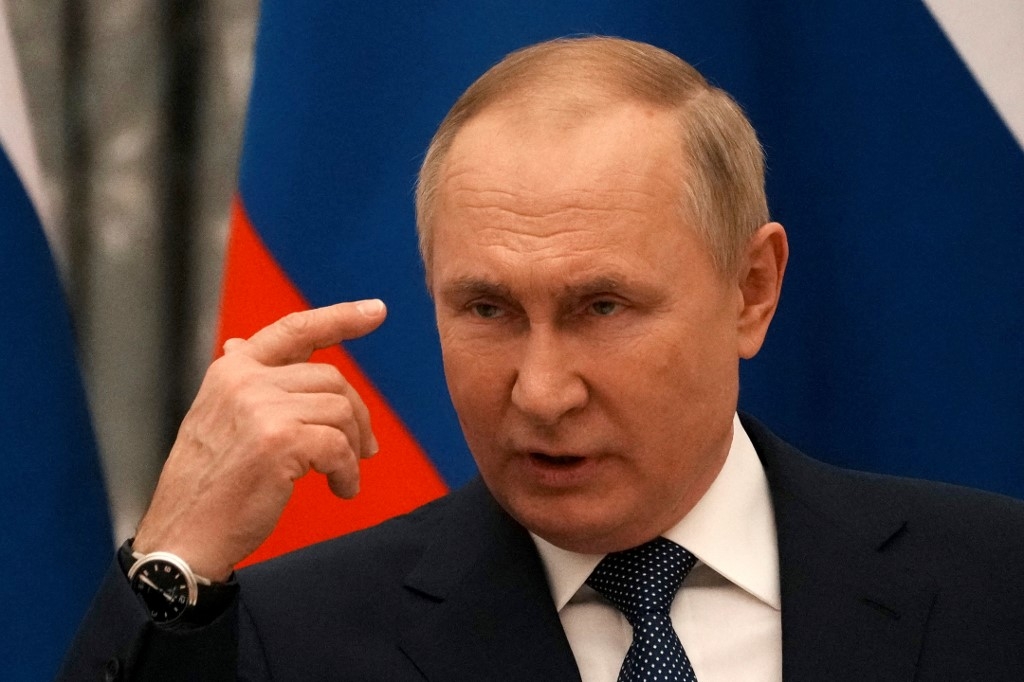
Occasionally, the masters of the military-industrial complex let slip how global tensions are improving their balance sheets.
Such moments of candour from arms executives are useful indicators of what’s really happening when it comes to peace, war and the turning of a healthy profit. Recently, the CEOs of defence companies Lockheed Martin and Raytheon both candidly stated that the crumbling state of global peace and security was good news for their investors.
'Tensions in eastern Europe, the tensions in the South China Sea, all of those things are putting pressure on some of the defence spending over there. So I fully expect we’re going to see some benefit from it'
- Greg Hayes, Raytheon CEO
Raytheon’s Greg Hayes was forthright about his glee at a potential war over Ukraine, as well as Houthi drone attacks on the United Arab Emirates, when he told shareholders:
“[W]e are seeing, I would say, opportunities for international sales. We just have to look to last week where we saw the drone attack in the UAE, which have attacked some of their other facilities. And of course, the tensions in eastern Europe, the tensions in the South China Sea, all of those things are putting pressure on some of the defence spending over there. So I fully expect we’re going to see some benefit from it.”
That threat, especially in Ukraine, has been much talked up in recent months, with tens of thousands of Russian troops now on the border with its neighbour.
New MEE newsletter: Jerusalem Dispatch
Sign up to get the latest insights and analysis on Israel-Palestine, alongside Turkey Unpacked and other MEE newsletters
The feverish daily commentary from the US State Department and media outliers suggests an imminent plan by Russian President Vladimir Putin to invade Ukraine, using everything from false flags to coup plots.
The mute and the deaf
Russia is carrying out war games in Belarus this week, and moving tanks up through the Black Sea on amphibious transport ships, seen by Nato as potential preparations for an attack from north and south.
"This is probably the most dangerous moment... in what is the biggest security crisis that Europe has faced for decades,” said UK Prime Minister Boris Johnson on Thursday.
British Foreign Secretary Liz Truss has been in Moscow, displaying a severely limited knowledge of Russian history and geography and drawing the weary ire of her veteran counterpart Sergei Lavrov, who described their meeting as like "a conversation between the mute and the deaf".
French President Emmanuel Macron similarly came away empty-handed after six hours of talks with Putin on Monday.
Read Russian media, and you will find villainous US and UK moves to escalate the conflict, including British special operations forces training up Ukrainian militias in the arts of sabotage and counter-insurgency, as reported this week. Just over 100 UK special forces, including the SAS and SBS, have recently returned from Afghanistan and are now being deployed to Ukraine.
"I've heard people talk about it as if the US is about to invade Russia," a source in Moscow said. For him, this is as much about internal power as it is external. It's a scenario that helps bolster domestic support for Putin, in the same way British sabre-rattling aims to do for the UK's embattled prime minister.
A recent interaction between State Department spokesperson Ned Price and a veteran AP journalist took this smoke-and-mirrors game of war brinkmanship to the point of absurdity.
The journalist, Matt Lee, demanded some evidence behind the official’s claim that the Russians were planning to conduct a false flag operation in eastern Ukraine. Price responded, saying “this is derived from information known to the US government... information that has been declassified.”
“Ok, but where is this information?” the journalist replied. “It is intelligence information that we have declassified.” “Where is it? Where is the declassified information?”
Price: “I just delivered it.” “No, you made a series of allegations…” Price then offers to print out his “briefing”. “No, that’s not evidence, Ned, that’s you saying it, that’s not evidence.” Price stumbles on as the journalist reminds him that he was told that Kabul was not going to fall. And so it goes.
This kind of briefing can’t help but recall, as Lee suggested, the feverish months in the run-up to the 2003 invasion of Iraq.
At the time, all kinds of plots and plans were revealed by western intelligence, down to the final imminent threat of Saddam’s weapons of mass destruction that could be launched against targets in the UK “within 45 minutes”.
'Invasionology'
Kremlinology was a favourite pastime of western intelligence and media during the Cold War, and today is little different, with an equal paucity of anything solid and well founded amid the speculation.
The latest iteration of this dubious science is called "invasionology", a kind of astrology predicting when Russia will strike. It could be tomorrow, it could be the next day, perhaps it will be next week.
In the 21st century, the media war is a critical element of any pre-war planning, and this appears to be reaching its crescendo.
By talking up the inevitability of a war in Ukraine against Russia, western intelligence agencies and their media outliers are implanting the idea that war has already started. Bloomberg even accidentally announced that Russia had invaded Ukraine (before apologising).
If they are right, Putin's invasion plans are just a matter of time. Based on what the Russian president says publicly, he wants the West at the very least to rule out Ukrainian membership of Nato - something the Atlantic alliance has refused to do.
The Russian leader warned this week that any move by Ukraine to join Nato would spark a war, reminding the West of Russia's nuclear capability: "There will be no winners. And you will be pulled into this conflict against your will. You won't even have time to blink your eye when you execute Article Five (the collective defence article binding Nato members)."
The view from Russia
Analysts' attempts to understand the real thinking in Moscow could also be inverted and applied to Washington's deeper motives.
After all, the State Department has spent decades planning how to shift the borders of the western alliance eastwards, aided by so-called "colour revolutions" and Nato’s expansionist remit. As an IT entrepreneur in Moscow told the New York Times: “America pursues its geopolitical goals in the post-Soviet space, it wants to divide Russia and post-Soviet countries.”
It’s a common view, even among those who don’t like Putin.
The US and Nato are pouring in high-tech weaponry and training up Ukraine’s armed forces, making it a much more militarily capable foe.
If Ukraine, the Donbass or Crimea is where war breaks out, it will be where Russia has in the past fought many of its decisive battles, against the Ottomans and Tartars from the 17th to 19th century, the White Army in the civil war, and the Wehrmacht.
From where the Russians are sitting, the deployment of billions of dollars worth of new US and UK military hardware on its borders is a sign of escalation, rather than defence.
The narratives repeated in the western media are so thunderingly pro-Ukrainian and anti-Putin that it is hard to extract from the simplistic framing the complex nature of the conflict.
Even Ukrainian President Volodymyr Zelensky has apparently begun to see the war hype being promoted by the western media as unnecessarily talking up the prospect of conflict, damaging his country's economy in the process.
The commander of Ukraine’s land forces is also not buying that Russia is about to invade, believing it doesn’t have sufficient forces in place to launch an attack. “We see training, we see movement, but we don’t see direct attack preparations or the preparation of strike forces,” he told the Guardian last week.
'Enormous gamble'
Most polls find that support among Ukrainians for joining Nato has increased significantly since Russia's annexation of Crimea in 2014, and is now above 50 percent.
Today, some on the Ukraine side do want to fight. Middle East Eye’s Sean Mathews recently reported on the militant Muslim fighters who were volunteers on the frontline with Ukraine’s far-right brigades, who candidly explained that they wanted to kill Russians.
They had grievances linked to Russia’s occupation of Crimea, the brutal treatment meted out to Crimean Tartars going back to Stalin, as well as the Chechnya and Syria wars that Putin waged against Islamist rebel groups.
Former Guardian Moscow correspondent James Meek recently outlined a scenario of Putin’s possible goal to achieve a land corridor between Russian-annexed Crimea, currently surrounded by hostile Ukrainian territory, and the Russian-backed breakaway regions of eastern Ukraine.
This would require a major military operation, possibly involving naval forces in the Azov Sea, to seize the blockaded North Crimea canal head and link up the two regions, further truncating Ukraine’s territorial integrity.
But Meek says this would be an “enormous gamble” and one Putin may not be willing to risk, not on such a scale at least. Yet many Anglo-American analysts are still predicting war this month, as they did last month.
The inescapable cycle of western geopolitical activity since the Cold War suggests that a major conflict is required every decade, and a justification will be found for it to be waged. From the Gulf War launched against Saddam Hussein’s invasion of Kuwait, to Afghanistan against the Taliban after 9/11, and Iraq (again), to Libya against Gaddafi, and Syria and Iraq against Islamic State, each new war had an imminent and urgent cause.
The difference this time is the opponent has nuclear weapons and a high-tech, battle-ready military. Meanwhile, Raytheon and Lockheed Martin rub their hands, as they look greedily at Ukraine.
Middle East Eye delivers independent and unrivalled coverage and analysis of the Middle East, North Africa and beyond. To learn more about republishing this content and the associated fees, please fill out this form. More about MEE can be found here.



